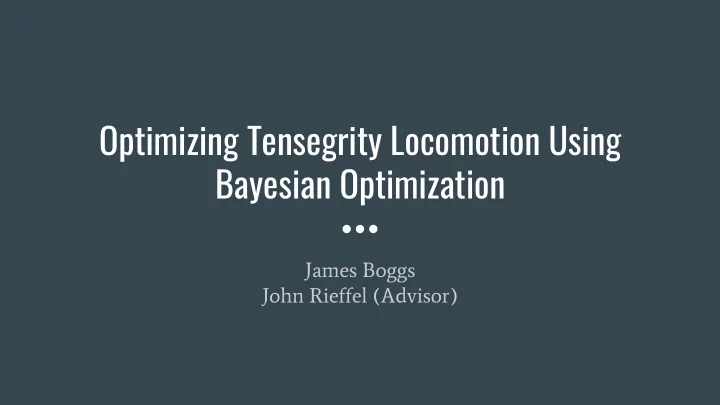

Optimizing Tensegrity Locomotion Using Bayesian Optimization James Boggs John Rieffel (Advisor)
What is a tensegrity?
How do we get a tensegrity to move?
Research question: To what extent can we replicate Rieffel and Mouret’s results by using Bayesian optimization to find motor frequencies which produce forward motion on our tensegrity?
Building the tensegrity I worked with Alex Chu (ME), Kentaro Barhydt (ME), Riley Konsella (CPE) and Mitchell Clifford (EE) to produce a wireless-enabled tensegrity strut by writing Arduino control code
Bluetooth control process Desktop Computer 3) experiment done 1) startup status 2) frequency to run RFDuino
Creating the testing setup There are both hardware and software components:
Tensegrity tracking algorithm b) c) a) f) e) d)
What is Bayesian optimization? Function estimate Result Frequencies Evaluation
Running the Bayesian optimization code
Running the Bayesian optimization code
Running the Bayesian optimization code
Tensegrity movement vectors
Results
Results
Results
Conclusions Working with Riley, Alex, Mitchell, and Kentaro, I helped improve our tensegrity ● by making it wireless and giving more features ● Working with Kentaro, I helped build a new testing setup to accompany the new tensegrity I developed a tracking algorithm using OpenCV to track our tensegrity and allow ● us to perform tests with it ● Using an out-of-the-box Bayesian optimization package for Python, I demonstrated that Bayesian optimization can be used to develop effective tensegrity gaits
Future work This term: ● Test out different acquisition functions Long-term: ● Use Bayesian optimization baseline to evaluate other methods of gait generation
Acknowledgements John Rieffel, Kentaro Barhydt, Mitchell Clifford, Tommy Sipple, Katerina Petridou
Recommend
More recommend